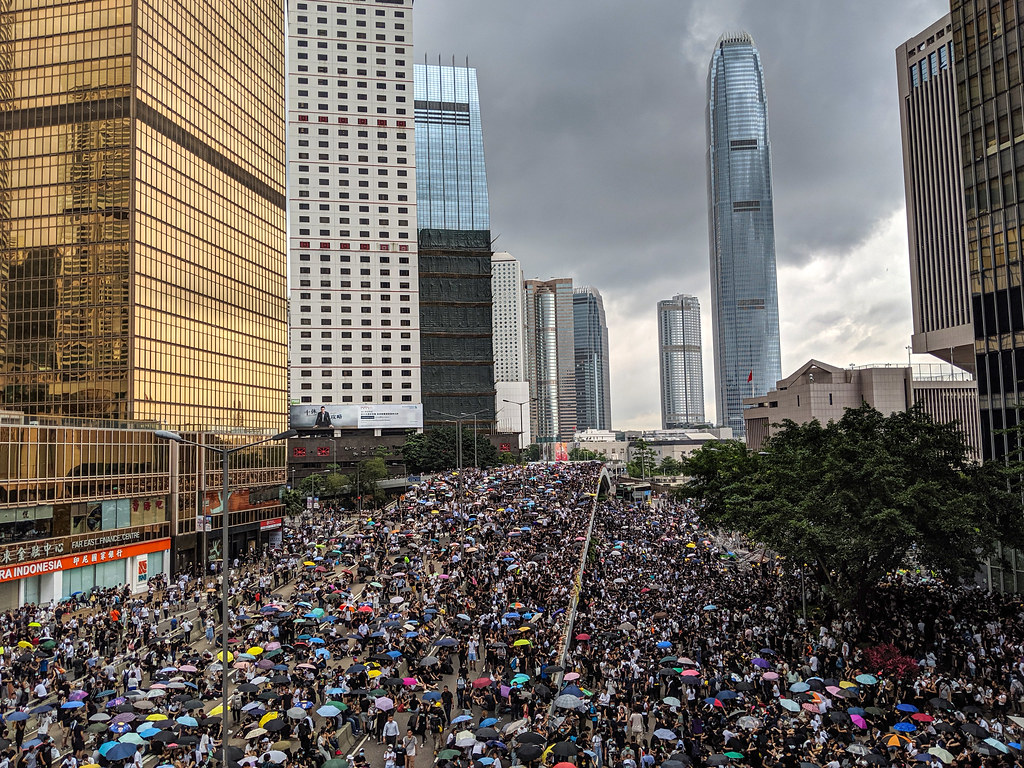U.S. Social Media Companies Block Accounts From China Over Hong Kong Disinformation
Twitter, Facebook, and Google Block Accounts Over Hong Kong Disinformation Campaign

Published by The Lawfare Institute
in Cooperation With

Twitter, Facebook, and Google Block Accounts Over Hong Kong Disinformation Campaign
On Aug. 19, Twitter issued a public statement revealing the existence of a “significant state-backed information operation focused on the situation in Hong Kong.” Twitter identified 936 accounts “originating from within the People’s Republic of China,” all of which were “deliberately and specifically attempting to sow political discord in Hong Kong.” Twitter has suspended those accounts, which violate Twitter’s platform manipulation and spam policy. That policy prohibits behavior such as “coordinated activity,” defined as attempts to “artificially influence conversations through the use of multiple accounts, fake accounts, automation and/or scripting,” or “inauthentic engagements,” that is, attempts to make accounts “appear more popular or active than they are.” Twitter has published two sets of archives documenting the Tweet history and user information of the 936 banned accounts.
On the same day, Nathaniel Gleicher, Facebook’s head of cybersecurity policy, similarly announced the removal of seven pages, three groups and five accounts. Facebook acted based on a tip shared by Twitter about the latter’s investigation. Gleicher accused the “individuals behind this campaign” of engaging in “deceptive tactics” such as using fake accounts or posing as news organizations. He explained that, despite participants’ efforts to conceal their identities, “our investigation found links to individuals associated with the Chinese government.” Several days later, Google announced the disabling of 210 YouTube channels after discovering that these channels “behaved in a coordinated manner” while uploading videos related to the Hong Kong protests. Unlike Twitter and Facebook, Google stopped short of criticizing China for its involvement in the disinformation campaign.
The Hong Kong protest movement began in June and has since attracted millions of demonstrators. The protests began as a challenge against an extradition bill that would have created a “case-by-case model to transfer fugitives to any jurisdiction that Hong Kong lacks a formal agreement with, including mainland China.” Hong Kong Chief Executive Carrie Lam has indefinitely suspended that bill, though the Hong Kong government has yet to withdraw the bill. Protests have continued, with some demonstrators now calling for an independent inquiry into police violence and a more democratic, transparent and open government. The protest movement is far from monolithic. It should be noted, for example, that these protests aren’t only about democratic rights and the extradition bill. As David Dodwell, formerly of the Financial Times, has argued, extreme economic stratification and frustration over “stagnant economic fortunes” has also helped fuel the movement.
While the Hong Kong protests have generated a wave of international sympathy, they have also generated nationalistic backlash within mainland China. Many of the accounts blocked by Facebook and Twitter employed martial language, accusing protestors of disloyalty. One of the pages cited as part of the Facebook press release, for example, compared Hong Kong protestors to Islamic State fighters, while another compared protestors to “cockroach soldiers.” Days ago, CCTV and China Daily, both state media organizations, shared a poem comparing protestors to Nazis.
Facebook’s and Twitter’s clamp-downs have likewise generated backlash, with mainland Chinese internet users complaining about the suppression of free speech, despite Twitter CEO Jack Dorsey’s well-documented commitment to free speech and hesitance to block content based on differing “political or social views.” One op-ed in the People’s Daily argued that Twitter and Facebook have “abused the freedom of the press” by “labeling truth as rumor and removing voices of reason.” Ultimately, despite Facebook’s, Twitter’s and Google’s efforts to counter coordinated disinformation, it is clear that a significant portion of mainland Chinese opinion remains firmly opposed to the protest movement and that inflammatory, often-inaccurate posts will only continue to proliferate, if not on Western media, then certainly on Chinese media sites.
Erratic Comments From President Trump Create New Trade War Uncertainties
New uncertainties about the direction of the U.S.-China trade war emerged this week following a series of contradictory statements from President Trump. On Aug. 23, the administration was poised to significantly escalate the dispute after announcing that it would introduce 15 percent tariffs on $300 billion of Chinese goods beginning in September and increase existing tariffs on $250 billion of Chinese goods by five percentage points to 30 percent in October. The Chinese government responded that it would in turn place tariffs on $75 billion of American imports.
The same day, a series of tweets from the president threatened to block all U.S. companies from doing business with China. He proclaimed that:
The vast amounts of money made and stolen by China from the United States, year after year, for decades, will and must STOP. Our great American companies are hereby ordered to immediately start looking for an alternative to China, including bringing your companies HOME and making your products in the USA.
President Trump and his advisers assert that the U.S. government has the authority to issue such an order under the International Emergency Economic Powers Act (IEEPA). However, IEEPA has never been used for such an action in the past, and to use it, the president would need to first declare an emergency—most likely centered on Chinese intellectual property theft—and then design a remedy in response. A court is not likely to uphold a complete ban on U.S. companies operating in China even if an emergency is declared, but the administration could potentially introduce new requirements on those companies’ behavior.
The president then abruptly changed course over the weekend while attending the G-7 meeting in France. He stated that he had “no plan right now” to pull U.S. companies out of China and that in fact the two countries were “getting along very well.” In particular, President Trump interpreted recent remarks from Chinese Vice Premier Liu He, the leader of the trade negotiations on the Chinese side, as a sign that negotiations were imminent. Speaking at a technology conference on Monday, Liu said, “We are willing to resolve the issue through consultations and cooperation in a calm attitude and resolutely oppose the escalation of the trade war.” Liu’s remarks were fairly routine, and it is not clear that the Chinese government has come to a consensus on whether to try to rapidly negotiate an end to the trade war or allow it to continue and retaliate with further tariffs. Nonetheless, President Trump responded by stating, “I think they want to make a deal very badly” and adding, “[W]e’re going to start very shortly to negotiate.…This is the first time I’ve seen them where they really want to make a deal.”
President Trump’s contradictory comments also come at a moment when the trade war’s economic effects are beginning to be felt more acutely in the United States. The combination of the tweets and the tariff announcements led stocks to plummet on Friday. More generally, a recent survey from the Federal Reserve Bank of New York found that the tariffs introduced in 2018 cost American households $419 on average. Farmers have been particularly hard hit by reduced agricultural purchases from China. In the first six months of 2019, agricultural exports declined by $1.3 billion. As the United States heads into an election year, the Chinese may not be the only ones who “want to make a deal very badly.”
In Other News
- On Friday, Huawei launched the Ascend 910, the world’s “most powerful AI processor,” as well as Mindspore, an AI computing framework. Huawei had unveiled the Ascend 910 in October 2018. The chip is designed to be used in data centers and internet-connected consumer devices, and represents a significant leap forward as Huawei and other Chinese telecommunications companies decrease their dependency on U.S. chipmakers and suppliers. As CNBC notes, Huawei has “focused its efforts on homegrown technology” and recently launched Hongmeng OS, a new operating system designed for use on devices ranging from smartphones to speakers.
- An investigative piece by the Wall Street Journal revealed that Huawei technicians have helped African governments “spy on political opponents” by intercepting their encrypted communications. Huawei has long mounted significant outreach efforts on the African continent. A recent Xinhua piece focused on deep cooperation between “China and Nigeria,” noting that 935 Nigerian civil servants recently graduated from a “training program on information and communications technology” directed by Huawei. Although the Journal did not find that “Huawei executives in China knew of, directed or approved the activities described,” the report makes clear that not all of Huawei’s efforts in Africa have been benign.
- In other Huawei news, the Commerce Department announced that it would renew the 90-day temporary general license issued to Huawei in May after it was placed on the Entity List. This will allow Huawei to continue to purchase some U.S. components necessary to supply existing customers, a boon for U.S. rural broadband networks that rely on equipment from the company.
- As the Nikkei Asian Review reports, China’s Beidou navigation satellite system has “overtaken its U.S. rival in size.” China launched 18 satellites for its system last year, and as of the end of June, “there were 35 Beidou satellites in operation, compared with 31” for America’s Global Positioning System. Satellite-based positioning systems calculate the real-time position of a device and allow for functionalities ranging from calculating driving directions to mapping the earth. China Daily has argued that the Beidou navigation satellite system “aims to provide an alternative global navigation satellite system coexisting with” other satellite systems. Yet certain U.S. policymakers are worried about the Beidou system’s national security implications. Chinese satellites, for example, might be used to jam signals in specific areas, thereby proving useful in disruptive cyber operations.
Commentary
Elsa Kania and Wilson VornDick analyze the ways in which biotechnology is gaining prominence in the People’s Liberation Army’s strategic thinking and civil-military fusion programs. A new report from Alina Polyakova and Chris Meserole at Brookings explores the export of digital authoritarianism, including the systems of technologically enabled surveillance in Xinjiang, and how the United States can respond with increased use of export controls and sanctions. Benjamin Haas at the Mercator Institute for China Studies argues that European countries must be more active in analyzing their companies’ ties to Xinjiang, including those of some major technology firms like Siemens.
Grace Hearty analyzes whether rare earth metals are likely to be weaponized as part of the trade war. In a new podcast for the European Council on Foreign Relations, Mark Leonard, Tim Rühlig and Amy Studdart discuss whether Europe should enter the fray of the U.S.-China trade war. The Belfer Center translates an essay by retired Major General Hao Yeli laying out her interpretation of what the concept of “cyber-sovereignty” means, accompanied by a response from members of the center. Finally, in Foreign Affairs, Orville Schell analyzes the parallels between the Chinese Communist Party’s massacre or protesters at Tiananmen Square and what might happen in Hong Kong.
On Lawfare, Martijn Rasser argues that the United States should learn from the dominant approach China has assumed in developing 5G infrastructure and begin looking ahead to how it can be a leader in establishing 6G networks. Bruce Schneier explains why recent Justice Department statements that they will seek access to “encrypted consumer devices” but not “business products” or “critical infrastructure” fails to understand the overlap between the different categories of devices. Robert S. Taylor considers why qualitative metrics, not just quantitative ones, are necessary to measure cybersecurity in a response to an earlier article by Paul Rosenzweig.






